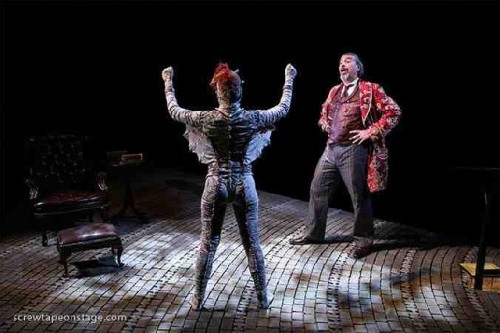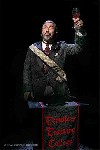The Screwtape Letters on Broadway
C.S. Lewis's Advice from the Devil Enthralls
By: Susan Hall - May 10, 2010
,
The Screwtape Letters
Adapted and Directed for the Stage by Jeffrey Fiske and Max McLean
Westside Theater, New York City
Screwtape Max McLean
Toadpipe Karen Eleanor Wight
Scenic Design Cameron Anderson
Costume Design Michael Bevins
Lighting Design Jesse Kluge
Original Music and Sound Design John Gromada
The Screwtape Letters, created by Jeffrey Fiske and Max Mclean, who plays one of the devil’s underlings, has been traveling around the country for a few years, and played to acclaim in New York once before. It is an arresting and fascinating monologue and performance. Screwtape reports an underling's effort to subvert God and gives his own interpretation of ‘how-to’ stop this. Even though there is only one character who speaks, his amanuensis, Toadpipe, a personal secretary, prowls around him and his purgatory for the entire rant. Toadpipe, performed with spot on timing by Karen Eleanor Wight. is crawling, bounding and climbing around a wonderfully conceived upper layer of hell.
Describing the set by Cameron Anderson is challenging. The floor above the hot fires of hell, which occasionally flicker up, is shaped like the prow of a ship. One end of a periscope is used to transmit messages to subordinate devils at work on the earth. A wall of skulls and bones provide a backdrop which helps understand George W. Bush’s origins.
Lewis famously battled with students in debate and was thought by some to be cruel. These ‘letters” echo some of his heartlessness. How can an assistant-to-the-devil-in- training slip so, giving God a chance to enter a human, instead of helping the devil drag that soul down below?
Lewis is extremely good at describing the territory of the moral life which for most of us is thrashed out in the quotidian of the real world. McLean makes selections which reflect this. While Lewis had an unusual ability to see his failings and those of others, he brings a rich sense of comedy and satire. He presents an intriguing list of failures which we don’t find in the usual catalogues. Lewis’ own sadism is let loose. “She’s the sort of woman who lives for others – you can always tell the others by their hunted expression.”
“She is always turning from what has been offered her to say with a demure little sigh and smile, ‘Oh please…all I want is a cup of tea.’ ..Because what she wants is smaller and less costly than what has been set before her, she never recognizes the gluttony in her determination to get what she wants, no matter how troublesome it is to others.”
Lewis's advice on duping people is terrific. “When two humans have lived together for many years it usually happens that each has tones of voice …which are almost unendurably irritating to the other.” Point out “the lift of his mother’s eyebrows which he learned to dislike in the nursery.. let him assume that she knows how annoying it is…if you know your job, he will not notice the immense improbability of the assumption.”
Lewis notes how clever God is. "...all that talk about His love for man,..is not...mere propoganda but an appalling truth. He really does want to fill the universe with little replicas of himself...their free wills freely conform to his. We want cattle who can finally become food." "God is a hedonist at heart. All those fasts and vigils and stakes and crosses are only a facade. At his right hand are pleasures for ever more. Ugh."
McLean has brilliantly captured Lewis’ declamations, personal struggles with his lesser self, and a vicious side. What he does not capture so well are the two characters within Screwtape.
Lewis's high school teacher. who had also taught Lewis’s father, argued this way, “If after eight years of experience, they (British politicians) did not grasp the German menace, they are convicted of stupidity; if they did know it,…they are guilty of moral cowardice and neglect of the highest national interests. They may choose which horn of the dilemma they prefer but escape from one or the other is impossible.” McLean’s force of delivery makes the problems seem inescapable, but also eludes the debate Lewis intended. It feels like we're looking at just one horn.
Lewis had dedicated the Screwtape Letters to J.R. R. Tolkein, to whom he also attributed his religious conversion. Tolkien, perhaps jealous of Lewis far greater success, did not like Lewis as "everyman's theologian."
How we delude ourselves is the subject of this piece. It feels very contemporary when you think about the health care bill, which at best we are told to close our eyes, pinch our noses and accept. Arguably, God would have preferred to put doctors in charge of their business.
This was a provocative, lively evening well worth watching and hearing. Inspired malice is given creative rein. McLean is deliciously over the top as any devil would be. Lewis claimed to have experienced much pain when he wrote these letters, but it certainly isn't on display in the bravado performance.



